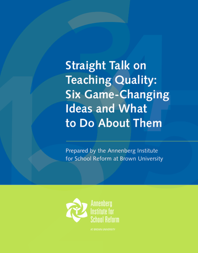Press Release
Annenberg Institute Cuts Through Clutter on Teaching Quality; Issues Guide with Six Game-Changing Strategies
 PROVIDENCE—Striding into the hottest topic in public education, Brown University’s Annenberg Institute for School Reform today issued “Straight Talk on Teaching Quality: Six Game-Changing Ideas and What to Do About Them,” a concise guide for improving teaching effectiveness.
PROVIDENCE—Striding into the hottest topic in public education, Brown University’s Annenberg Institute for School Reform today issued “Straight Talk on Teaching Quality: Six Game-Changing Ideas and What to Do About Them,” a concise guide for improving teaching effectiveness.
The 24-page publication, prepared for the Schott Foundation for Public Education, is based on the substantial evidence that links teaching quality and student achievement. The six strategies reflect the institute’s nearly two decades of experience with school districts, researchers, parents and community members, and its comprehensive survey of the field.
“We’ve identified six powerful supports for the quality of instruction,” said the guide’s authors. “Our objective is to share the information that we’ve culled from a rich array of resources and provide a useful tool for parents, school board members, policymakers and other community stakeholders who are advocating for all children to have a fair and substantive opportunity to learn.”
While the guide readily acknowledges that teaching is the “single most important in-school influence on student learning,” it equally stresses that other internal and external factors, such as teacher (peer) networks, community partnerships and district/school leadership exert tremendous influence on teaching quality.
The six strategies are identified by their respective chapter headings:
- “Follow Your Bliss: Career Pathways for Teachers”
- “Evaluation Nation: Multiple Ways of Measuring Performance”
- “Supports for Teachers, Not Just Rewards and Sanctions: Why Firing Teachers Won’t Lead to Large-Scale Improvement”
- “Environmentally Friendly: Why School Culture and Working Conditions Matter”
- “No Teacher is an Island: The Importance of In-School Partnerships and Teacher Collaboration”
- “No School is an Island: Partnerships with Parents and Community”
Treading directly into the current controversy over teacher assessment, the guide supports continuing efforts to strengthen accountability, but states “replacing current systems with equally ineffective ones that rank teachers based on narrow standardized test scores will not transform teaching and learning. Instead, evaluation systems should be designed to identify excellence and help teachers improve their practice by considering multiple measures of effectiveness.”
John H. Jackson, President and CEO of the Schott Foundation for Public Education praised the guide for “empowering parents and other advocates with key strategies to improve teaching quality, which is vital to closing the opportunity gap that threatens children of color and students in low-income communities. The Annenberg report moves beyond the ‘blame game’ roadblock with powerful, proactive solutions.”
Commenting on the guide, Barnett Berry, founder and president of the Center for Teaching Quality, states: “The Annenberg Institute has produced an insightful analysis of both how to recruit well-prepared teachers and ensure they work under the conditions that allow them to teach effectively. Rising well above the typical school reform chatter of today, ‘Straight Talk on Teaching Quality’ surfaces compelling research, identifies best practices, and promotes smart policies.”
Adds Judith C. Marley, Ed.D., dean of the Graduate and Professional Programs at Emmanuel College in Boston, “As an educator interested in the community impact by urban schools on the future workforce, I’m impressed with the guide’s segments on effective parent and community partnerships.”
A recent, groundbreaking study [LINK] by economists at Harvard and Columbia universities examined the lives of 2.5 million students over 20 years and found that teachers have far more lasting and wide-ranging effect on students than most researchers had ever realized. Students who were taught by highly effective elementary and middle school teachers had lower teen pregnancy rates, higher college enrollment rates, higher earnings, and lived in better neighborhoods.
The guide is available on both the respective web sites of the Schott Foundation (schottfoundation.org/publications/StraightTalk) and the Annenberg Institute (annenberginstitute.org/news/straightTalk).
About The Schott Foundation for Public Education
Founded in 1991, the Schott Foundation seeks to develop and strengthen a broad- based and representative movement to achieve fully resourced, high-quality preK-12 public education. Schott supports an “Opportunity to Learn” frame on educational policy, which focuses on ensuring that four core resources are provided for all students, regardless of where they live, to have an equitable opportunity to learn and produce high achievement outcomes: early childhood education, highly prepared and effective teachers, college preparatory curriculum, and equitable instructional materials and policies.
About the Annenberg Institute for School Reform
The Annenberg Institute for School Reform is a national policy-research and reform-support organization, affiliated with Brown University, which focuses on improving conditions and outcomes for all students in urban public schools, especially those serving disadvantaged children. The Institute’s vision is the transformation of traditional school systems into “smart education systems” that develop and integrate high-quality learning opportunities in all areas of students’ lives – at school, at home, and in the community. The Institute conducts research; works with a variety of partners committed to educational improvement to build capacity in school districts and communities; and shares its work through print and Web publications. Rather than providing a specific reform design or model to be implemented, the Institute’s approach is to offer an array of tools and strategies to help districts and communities strengthen their local capacity to provide and sustain high-quality education for all students.


